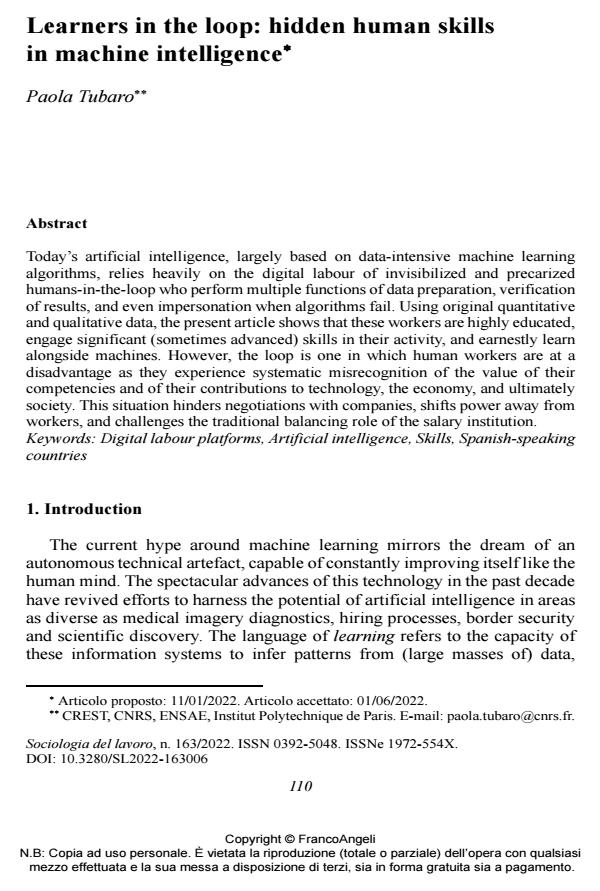Learners in the loop: hidden human skills in machine intelligence
Titolo Rivista SOCIOLOGIA DEL LAVORO
Autori/Curatori Paola Tubaro
Anno di pubblicazione 2022 Fascicolo 2022/163
Lingua Inglese Numero pagine 20 P. 110-129 Dimensione file 236 KB
DOI 10.3280/SL2022-163006
Il DOI è il codice a barre della proprietà intellettuale: per saperne di più
clicca qui
Qui sotto puoi vedere in anteprima la prima pagina di questo articolo.
Se questo articolo ti interessa, lo puoi acquistare (e scaricare in formato pdf) seguendo le facili indicazioni per acquistare il download credit. Acquista Download Credits per scaricare questo Articolo in formato PDF

FrancoAngeli è membro della Publishers International Linking Association, Inc (PILA), associazione indipendente e non profit per facilitare (attraverso i servizi tecnologici implementati da CrossRef.org) l’accesso degli studiosi ai contenuti digitali nelle pubblicazioni professionali e scientifiche.
Today’s artificial intelligence, largely based on data-intensive machine learning algorithms, relies heavily on the digital labour of invisibilized and precarized humans-in-the-loop who perform multiple functions of data preparation, verification of results, and even impersonation when algorithms fail. Using original quantitative and qualitative data, the present article shows that these workers are highly educated, engage significant (sometimes advanced) skills in their activity, and earnestly learn alongside machines. However, the loop is one in which human workers are at a disadvantage as they experience systematic misrecognition of the value of their competencies and of their contributions to technology, the economy, and ultimately society. This situation hinders negotiations with companies, shifts power away from workers, and challenges the traditional balancing role of the salary institution.
Basata su algoritmi di apprendimento automatico (machine learning) ad alta intensità di dati, l’intelligenza artificiale di oggi si basa largamente sul contributo di "umani nel loop", invisibilizzati e precarizzati, che svolgono una varietà di funzioni di supporto. La partecipazione di questi lavoratori all’apprendimento automatico è una forma di digital labour, e fa parte di catene di approvvigionamento che si estendono in tutto il mondo per soddisfare le crescenti esigenze dell’industria tecnologica. L’articolo esplora come le nozioni di apprendimento negli esseri umani e di apprendimento automatico nelle macchine si intersecano e si influenzano a vicenda. L’analisi si basa sui dati originali di due studi a metodo misto, condotti rispettivamente in Francia e nel mondo di lingua spagnola (Spagna e America Latina). Contro un luogo comune, l’articolo mostra che il "loop" è uno in cui sia le macchine che le persone imparano, ed abilità umane molto avanzate vengono messe a valore. Tuttavia, gli esseri umani sono in svantaggio perché la riorganizzazione del lavoro in atto impedisce loro di ottenere un riconoscimento e di costruire una traiettoria di sviluppo personale e professionale. Minacciando il classico legame tra apprendimento/abilità e reddito, questo è un meccanismo attraverso il quale l’istituzione salario viene erosa.
Parole chiave:piattaforme di lavoro digitali, intelligenza artificiale, competenze, paesi di lingua spagnola
- Complex thinking through a Transition Design-guided Ideathon: testing an AI platform on the topic of sharing economy Jorge Sanabria-Z, Isolda Margarita Castillo-Martínez, Laura Icela González-Pérez, María Soledad Ramírez-Montoya, in Frontiers in Education 1186731/2023
DOI: 10.3389/feduc.2023.1186731 - 2024 International Conference on Decision Aid Sciences and Applications (DASA) Entesar Al Nama, Maqsood Mahmud, Huda Al Madhoob, pp.1 (DOI:10.1109/DASA63652.2024.10836337)
- Patient and Physician Exposure to Artificial Intelligence
Hype Scott Monteith, Tasha Glenn, John R. Geddes, Peter C. Whybrow, Eric D. Achtyes, Rita Bauer, Michael Bauer, in Pharmacopsychiatry /2025
DOI: 10.1055/a-2577-7214 - Dis//assemblages of AI: repair labor and resistance in the automated workplace Dominique A. Montiel Valle, Samantha Shorey, in Information, Communication & Society /2024 pp.2022
DOI: 10.1080/1369118X.2024.2371794 - 2025 IEEE 12th International Conference on Data Science and Advanced Analytics (DSAA) Maike Holtkemper, Christian Beecks, pp.1 (DOI:10.1109/DSAA65442.2025.11248023)
Paola Tubaro, Learners in the loop: hidden human skills in machine intelligence in "SOCIOLOGIA DEL LAVORO " 163/2022, pp 110-129, DOI: 10.3280/SL2022-163006